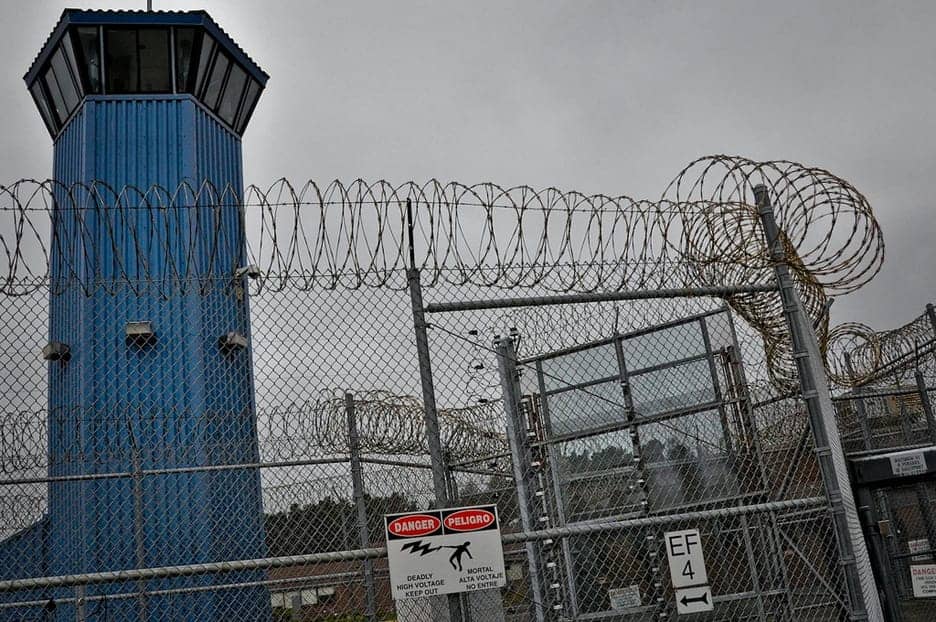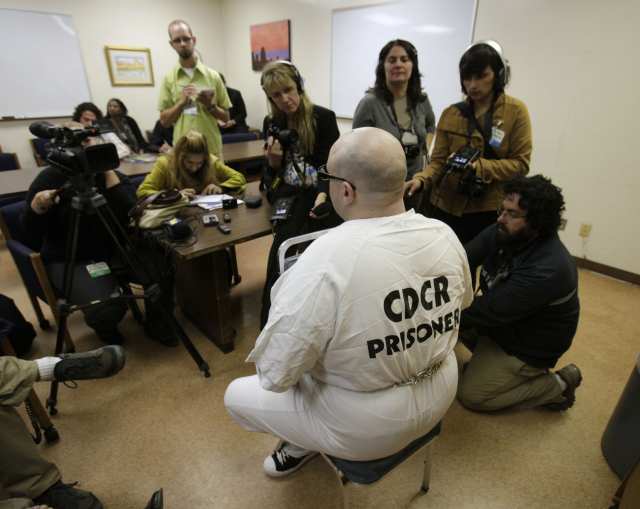Prison media access bill passes California Assembly
Prison media access bill passes California Assembly
February 12, 2012
by Quintin Mecke
Sacramento – The bill by Assemblymember Tom Ammiano, D-San Francisco, to restore media access to prisoners, AB 1270, passed the California Assembly Jan. 26. The bill would remove restrictions on pre-arranged in-person interviews with specific prison inmates. Since these restrictions went into effect in 1996, eight versions of the bill have been vetoed by three different governors.
 On Aug. 17, 2011, shortly after the first round of the hunger strike ended, a small number of mainstream media reporters were invited to a rare press tour of the Pelican Bay SHU. They were not, however, allowed to enter the “short corridor,” where the strike was organized. – Photo: Julie Small, KPCC
On Aug. 17, 2011, shortly after the first round of the hunger strike ended, a small number of mainstream media reporters were invited to a rare press tour of the Pelican Bay SHU. They were not, however, allowed to enter the “short corridor,” where the strike was organized. – Photo: Julie Small, KPCC
“Independent media access to prison inmates is a critical part of keeping our prisons transparent and accountable while providing information to the public,” said Ammiano. “Despite the thousands of prisoners who participated in a state-wide hunger strike last year over conditions in the prisons, it was near impossible to get unbiased information about what was happening due to these restrictions. Inmates kept in secure housing units (SHU) have no visitation or telephone privileges and information about their solitary confinement punishments are largely unknown to the public even though a disproportionate number of inmate suicides occur in the SHU.”
“Inmates kept in secure housing units (SHU) have no visitation or telephone privileges and information about their solitary confinement punishments are largely unknown to the public even though a disproportionate number of inmate suicides occur in the SHU.” – Assemblymember Tom Ammiano
Ammiano sponsored the bill citing the need for more transparency and public accountability from the California Department of Corrections and Rehabilitation (CDCR), an institution that receives $9.2 billion of taxpayer’s money. The bill passed unanimously in the Assembly Public Safety Committee on Jan. 10.
Carol Strickman, staff attorney for Legal Services for Prisoner with Children and a mediator during last year’s state-wide prison hunger strikes, stated: “Over the years, including during last year’s hunger strike, LSPC has been contacted by many journalists who wanted to interview prisoners about prison conditions. The reporters are always disappointed to learn about the media ban. While LSPC does its best to inform reporters based on our experience, we are an inadequate substitute for someone presently incarcerated. The public would be better informed if reporters could interview prisoners directly.”
 The only prisoner the reporters on the Aug. 17, 2011, press tour were allowed to interview was this man, who had decided to “debrief” – or snitch – so he could escape the torture of long term solitary confinement. Prisoners in the SHU are told the only way they can leave is to parole, debrief or die. Of the 1,111 people held in California SHUs, 513 have been there 10 years or more; of those, 78 have been in the profound isolation of the SHU for 20 years or more – the longest, Hugo Pinell of the San Quentin 6, for over 40. The overall purpose of the hunger strikes is to make a better way. – Photo: Rich Pedroncelli, AP
The only prisoner the reporters on the Aug. 17, 2011, press tour were allowed to interview was this man, who had decided to “debrief” – or snitch – so he could escape the torture of long term solitary confinement. Prisoners in the SHU are told the only way they can leave is to parole, debrief or die. Of the 1,111 people held in California SHUs, 513 have been there 10 years or more; of those, 78 have been in the profound isolation of the SHU for 20 years or more – the longest, Hugo Pinell of the San Quentin 6, for over 40. The overall purpose of the hunger strikes is to make a better way. – Photo: Rich Pedroncelli, AP
“Prisons tend to be out of sight, out of mind for anyone not directly impacted by them. That’s a recipe for rampant abuse, which is too often the story inside prisons. As taxpayers, we have a right to know what goes on behind prison walls. This bill offers a much-needed step forward in making prisons accountable to the public,” said Sumayyah Waheed, campaign director for the Books Not Bars program of the Ella Baker Center.
“If the only information the public gets is from the CDCR spokesperson, how can we really know what’s going on?” stated Dorsey Nunn, executive director of Legal Services for Prisoners With Children. “What makes Pelican Bay any different than Guantanamo Bay? Public safety requires openness inside the prisons as well as out. Crime often happens in dark, hidden places. In regards to prisons we depend on journalists and the media to be the light.”
“What makes Pelican Bay any different than Guantanamo Bay? … In regards to prisons we depend on journalists and the media to be the light,” stated Dorsey Nunn, executive director of Legal Services for Prisoners With Children.
The following organizations support the bill: Legal Services for Prisoners with Children,Prison Activist Resource Center, California Broadcasters Association, California Public Defenders Association, American Civil Liberties Union of California, California Newspaper Publishers Association, Ella Baker Center for Human Rights, California Families to Abolish Solitary Confinement, Drug Policy Alliance, Fair Chance Project, Friends Committee on Legislation of California, Pacific Media Workers Guild and the California Correctional Peace Officers’ Association, which includes prison guards and parole officers.

